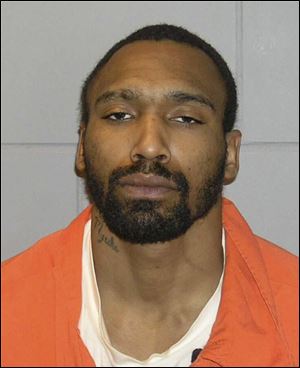
Man gets 35 years in prison for fire that killed 9 during birthday sleepover in Cleveland
6/20/2014
Antun Lewis.
CLEVELAND — A man twice convicted of killing a woman and eight children at a birthday sleepover in Cleveland’s deadliest house fire was sentenced today to 35 years in prison.
Antun Lewis, 30, had asked the judge for mercy and expressed condolences to the families of the victims, some of whom he knew. He said someone committed the crime “but it’s a lie that person was me.”
Lewis was deemed ineligible for the death penalty because of a mental disability. His attorneys presented evidence he has an IQ of 70 or less.
The fire killed 33-year-old Medeia Carter, four of her children and four other youngsters attending a birthday sleepover party on May 21, 2005.
Carter’s mother, Evelyn Martin, also spoke at the hearing, recounting the aftermath of the blaze.
“I had to stand there and watch them bring them out one by one,” Martin said.
She recalled seeing several of her grandchildren zipped in body bags at the medical examiner’s office and seeing skin falling off one of her grandsons, who later died.
“I hope you live long enough so all the skin falls off your damned body,” she told Lewis at sentencing.
Authorities said Lewis, upset over a drug debt, doused the three-story building’s first floor with gasoline.
Lewis said he was at home, several blocks away, when the fire started. He and his attorneys have claimed there was no drug debt and he has twice passed polygraph tests that show he is telling the truth.
U.S. District Judge Solomon Oliver presided over Lewis’ first trial, in early 2011. While a jury convicted Lewis of a count of arson, the judge overturned the verdict because of concerns about the reliability of jailhouse informants who testified against him. The defense portrayed the jailhouse snitches who testified against him as witnesses willing to say anything in return for lighter sentences.
The 6th U.S. District Court of Appeals upheld Oliver’s ruling in February 2012 and ordered that Lewis be given a new trial.
The appellate judges pointed out that one witness had a 30-year criminal record with a sixth-grade education, bipolar disorder and post-traumatic stress disorder and had spent half his life between state hospitals and prisons. That witness also gave numerous inconsistent and contradictory statements about the night of the fire to investigators and at trial, and phone records showed some of them were completely inaccurate, the judges said.
Prosecutors used some of the witnesses during the second trial, in December 2013, and a jury returned another guilty verdict. Lewis testified in his own defense at the second trial.